In an age where technology and society are facing unprecedented challenges, innovations in identity verification have become increasingly paramount. World, the ambitious project co-founded by Sam Altman, the CEO of OpenAI, is set to revolutionize this domain with the launch of its biometric identity verification system in the UK. Scheduled for release this week, the system utilizes a novel spherical eye-scanning device known as the Orb to authenticate users cryptographically. With the project expanding to major cities such as Manchester, Birmingham, Cardiff, Belfast, and Glasgow, World is poised to make a significant impact on how we perceive and manage digital identities.
The mechanism behind the Orb is ingeniously simple: it scans users’ irises to create a unique identification code that guarantees the individual’s humanity. This technology is not merely an academic exercise; it addresses real-world problems exacerbated by the rise of artificial intelligence, particularly concerning impersonation and fraud. The project’s application in various platforms, including gaming giants like Minecraft and social forums like Reddit and Discord, speaks volumes about its versatility. The fact that users earn rewards in the form of World’s cryptocurrency, WLD, upon verification adds another layer of engagement and utility.
An Answer to Rising AI Threats
As the digital landscape becomes increasingly vulnerable to sophisticated AI misuse, the need for robust verification methods grows. Adrian Ludwig, chief architect at Tools for Humanity, voiced these concerns in a recent interview, underscoring the heightened demand for World’s technologies from both enterprises and governmental bodies. Industries such as banking and online gaming face mounting threats from deep fakes and AI-generated fraud; thus, the urgency of World’s initiative cannot be overstated.
Moreover, this venture is evolving from a theoretical framework into a practical network that could potentially redefine digital interactions. The project recently launched in the U.S. with six flagship stores in major cities, thereby marking a significant step towards broader adoption. Ludwig has ambitious plans to scale the network, aiming to verify a dramatically larger number of users in the upcoming months. This scalability could fundamentally alter the landscape of digital verification, enabled largely by the processing capabilities of individual devices.
Privacy Concerns and Ethical Implications
Despite the innovative strides made by World, significant concerns about privacy loom large. Critics have raised ethical questions surrounding the use and storage of biometric data, questioning whether the encryption and subsequent deletion of original data adequately protect users. The decentralized verification system is praised for relying on user smartphones, ostensibly reducing risks associated with the cloud. But even with localized processing, as World aims to onboard millions, maintaining the integrity of user data becomes increasingly complex.
Historical precedents, such as India’s Aadhaar system, illustrate the pitfalls that can accompany large-scale digital identity systems. While Aadhaar aimed for inclusivity, it has been marred by reports of security breaches and social disparities. Ludwig’s assertion that World can offer a solution to these challenges raises the stakes of the initiative—both for its potential successes and the risks it carries.
Despite these challenges, there appears to be a growing interest among governments globally to explore digital ID schemes as a means of modernizing identity verification infrastructure. In his discussions with regulators, Ludwig has highlighted their inquiries about ensuring effectiveness and privacy protection. The stakes are incredibly high—if implemented correctly, such systems could vastly improve security, but if mishandled, they might exacerbate existing vulnerabilities.
The Future: Bridging the Gap Between Physical and Digital Identities
The conversation about adopting and normalizing digital identities carries weight and urgency in modern society. The gradual transition from physical ID cards to full-fledged digital systems signals a paradigm shift in how individuals interact with services and institutions. World’s biometric project represents an essential step in this direction, as it offers a means to authenticate identity in ways designed to be secure and user-centric.
Ludwig’s outlook on the evolving landscape of technological identity management offers a glimpse into a future shaped by innovation rather than reaction. As we continue to confront the influence of artificial intelligence on our daily lives, World’s initiative could serve as a bulwark against fabricated identities and fraudulent activities. The road ahead will undoubtedly be tumultuous, filled with both profound advancements and ethical challenges, but the dialogue surrounding these issues will be crucial as we navigate this new terrain.
In this rapidly changing landscape, adapting to emerging technologies while safeguarding privacy and security will be imperative. The unfolding narrative surrounding identity verification is just beginning, and how stakeholders engage with these complexities will likely determine the success or failure of ventures like World.

